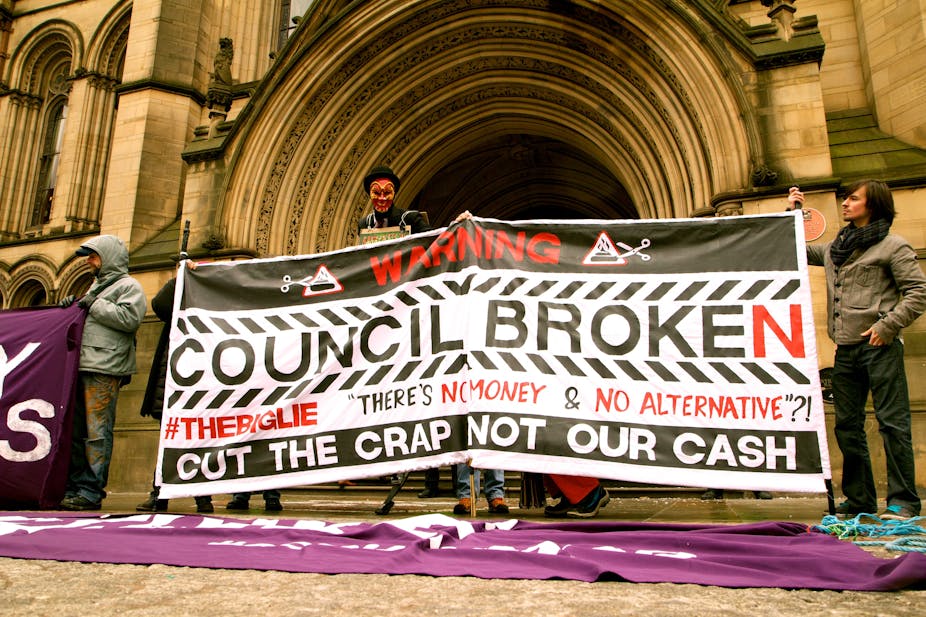If shrinking and reshaping the state is one of George Osborne’s big ideas then local authorities are right in the firing line. The chancellor’s recent spending review and autumn statement has local councils bearing the brunt of billions of further budget cuts.
As a former local authority chief executive, the announcements left me with the uncomfortable, but depressingly familiar impression of “smoke and mirrors”. While the cuts to local authorities were largely buried in the excitement of an apparent u-turn on tax credits, essential public services face serious cutbacks over the next four years with some of the biggest now backloaded into the fourth year, often as unidentified efficiency savings.
Local authorities are the traditional safety net for regional issues that can find no other advocate. When local communities or individuals have a problem – such as insurance issues after flood damage or the loss of a local post office or pub – and can find no designated agency willing to help, they invariably default to their local councillor and council.
But with resources already reduced by more than a third over the course of the last parliament, local authorities are rapidly losing their ability to react to changing circumstance or to meet the public’s needs. This is what that looks like in practice.
Education
Until recently, spending on schools and education was the biggest part of a local council’s responsibilities and budget. Previously councils were responsible for nurseries, schools and colleges, education infrastructure and support services such as special educational needs.
Committed to abolishing the role of local authorities in the schools system, however, the latest spending review will see the rise of more academies, as sixth-form colleges can now become academies. This flies in the face of numerous criticisms of academies’ admissions policies, wasting resources by creating excess school places, variable standards and privatisation to entrepreneurs with no experience of or expertise in education.

Social services and welfare
The biggest expenditure by local councils is now on a combination of social services, public health and welfare benefits. Despite the u-turn on tax credits, welfare spending overall will be cut by £12 billion by 2020, with specific cuts from a cap on housing benefit confirmed in the autumn statement.
Adult social care is one of the areas that will be most affected by these cuts. Councils have been given the option of increasing the portion of council tax dedicated to social care by 2% to meet this need. But this revenue will not be enough to rescue adult social care and in particular care homes who are faced with ever increasing demand and unit costs driven by minimum wage increases.
With Health and Social Care integration looking more and more essential by 2020, it is likely that social services and public health will have been subsumed by what remains of the already strained NHS.
Planning and transport
Planning is already becoming a token fig leaf at the local level, and investment in transport is becoming centralised. The Department of Transport was one of four departments that agreed cuts in their budgets over four years before the Autumn Statement, with spending set to fall by 37%. While capital spending is set to rise, local planning, delivery and maintenance of transport services and transport infrastructure is likely to suffer. Potholes, congestion and longer journey times are almost assured.
Recreation and culture
Councils also take care of sport, recreation and cultural facilities. At a personal level, local authorities register our births, marriages and deaths, they organise our elections and they provide funeral services. These are the sort of unprotected services which are under the greatest threat.

Local authorities will be reduced to being “commissioners” of services to be provided by others who will only do so for profit. Any service that cannot be run at a profit, will not exist. Nobody runs swimming pools, public parks, or museums at a profit – they require a public subsidy if they are to survive.
Cloak and dagger
Osborne and his acolytes have devolved responsibility while keeping a tight hold of the purse strings. By using the rhetoric of devolution and localism, Osborne is distancing himself from future direct responsibility for the damage to come. Relying on the private sector to pick up the slack will result in the most vulnerable sections of society, who don’t have the money to help themselves, suffering.
This approach to local government is a surrender to the market and the post code lottery. It will result in the entrenchment and extension of inequality between people and places.
Osborne’s obsession with the small state has a strong resonance with the administrations of Warren Harding and Calvin Coolidge. Two of the worst presidents in American history, they too believed in cutting back the state. Indolent and ignorant, but politically hugely popular in their time, their policies in the 1920s laid the foundations for the great crash and the depression of the thirties. While Osborne may have inherited the great recession, his policies will elongate its impact.

